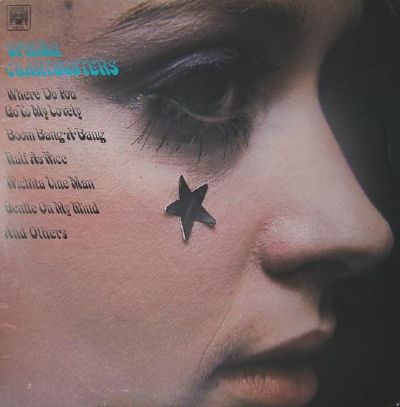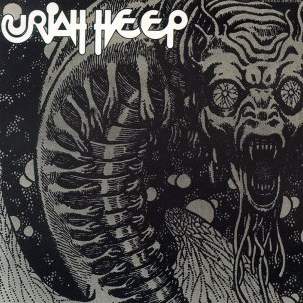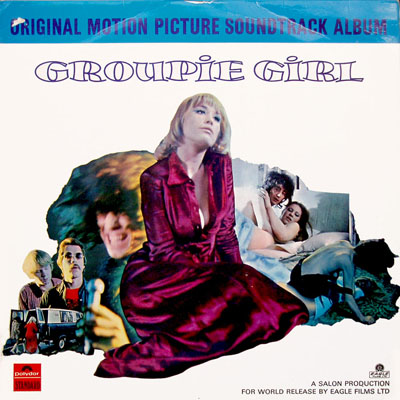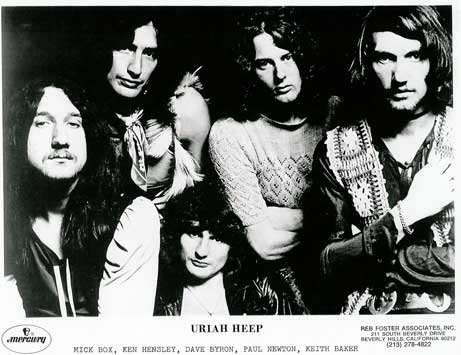![]()
Grasping Onto Tomorrow
1970
As
the decade of the 70s rolled around, rock and roll was changing; a heavier, more
progressive sound was taking over the masses and new bands were gaining
interest.

Gerry Bron spent the early part of 1970 pushing the band to put the final
touches on their first release. Most
of the material recorded for the first album was already introduced into the
live set by Spice, yet some of the tracks were being updated due to Ken
Hensley’s arrival. Although Ken
couldn’t be included in credits due to contractual obligations, his influence
can’t be dismissed; as Paul Newton recently explained, “Ken
had a great influence on the band due to his songwriting skills, guitar work and
general stage presence.” With
Ken now in the fold, most of the songs were re-recorded to get the right feel.
All traces of Colin Wood were
removed except for two songs; ‘Come Away Melinda’ and Wake Up (Set Your
Sights). The first, ‘Come
Away Melinda’ was a cover of the original Harry Belafonte song from 1963; the
band’s version was so unique and gave insight into how special David’s voice
actually was. The song itself
became a favorite of David and Mick from the cover done by Tim Rose in 1967; yet
their version was vastly different. The
song was a regular in the Spice live set well before this time.
It unveiled publicly how emotional David’s voice could be and it
displayed his true inner self, his comfort zone and the range of feelings that
David had the ability to convey vocally.
David was more open on tracks that featured feelings; little of the first
set of sessions recorded under the Heep moniker showcased this side of David's
abilities. Mick
Box said this about the song, “It was recorded with a mellotron which gave it
a great atmosphere, and to this day David Byron’s vocal performance on this
song sends chills down my spine.” As
far as David Byron’s contributions to the album, Ken Hensley had this to say,
“Dave carries the vocal flag with rare precision and expression and has
uncanny flexibility which makes him an instrument of his own.
A ‘Davotron’! As
one of the main writers in the band his contribution is priceless.”
In
the midst of all of this Bron had an idea to change the name of the band as a
result of all the celebration for the 100th anniversary of Charles
Dickens death. The band would take
a name from one of the characters in the Dickens’ book ‘David
Copperfield’. Gerry Bron said in a recent 2012 interview in Classic Rock
Magazine he got the name from an advertisement placed in Melody Maker by someone
seeking employment who he remembered writing, “Experienced roadie seeks work,
please call Uriah Heep.” Bron
went on to ad, “I thought, ‘Bloody hell, what a fantastic name’.”
On February 21, 1970 Spice played its last show in support of Deep Purple
at St. Mary’s College, Twickenham in
The band spent time rehearsing at Fox and Hounds pub in Chiswick,
An
acquaintance from David’s ‘Avenue Records’ sessions, Elton John suggested
the newest member to take a stool with the rhythm section.
Nigel ‘Ollie’ Olsson became the second drummer for Uriah Heep.
Mick Box remembers, “Reg
Dwight (Elton John) did suggest Nigel to be our drummer, as he had just finished
his first album with him.” Paul
Newton recalled, “David knew Nigel Olsson from some session work that they had
done together. Nigel had been
working in the Spencer Davies Band but they had stopped touring and he was
looking for something to do.” Olsson
ended up being credited with playing on only two songs on the album, ‘Lucy
Blues’ and ‘Dreammare’; this is attributed to being so late in the
recording sessions and the final addition of these songs to the album.
 With
the debut album finally completed, it was time to unleash it on the world, and
another Charles Dickens reference became the title, ‘Very ‘Eavy, Very ‘Umble’.
The original idea for the cover was to have David dressed in a tailcoat
and top hat to reflect the Dickens’ reference of the name.
After a session of photos it was clear the idea wasn’t working, and as
the story goes Mick Box decided to leave and go down to the local pub.
When Mick returned he had gotten hold of a cobweb machine that had been
brought in for the sessions. He
pointed it straight at David and seizing the opportunity, tapped David on the
shoulder and when he turned around Mick switched the machine on and it covered
David’s face with glue. The
photographer snapped the photographs, and in the process captured a surprised
but highly upset David Byron. The
cover was born, and as Mick Box recalled the incident, “If there was any doubt
at all, yes that is David Byron’s face in cobwebs on the front cover and it
was done by my good self with a glue based cobweb machine.
It took three weeks to get out of his hair and impressed David was not!
But it gave us a great cover!”
With
the debut album finally completed, it was time to unleash it on the world, and
another Charles Dickens reference became the title, ‘Very ‘Eavy, Very ‘Umble’.
The original idea for the cover was to have David dressed in a tailcoat
and top hat to reflect the Dickens’ reference of the name.
After a session of photos it was clear the idea wasn’t working, and as
the story goes Mick Box decided to leave and go down to the local pub.
When Mick returned he had gotten hold of a cobweb machine that had been
brought in for the sessions. He
pointed it straight at David and seizing the opportunity, tapped David on the
shoulder and when he turned around Mick switched the machine on and it covered
David’s face with glue. The
photographer snapped the photographs, and in the process captured a surprised
but highly upset David Byron. The
cover was born, and as Mick Box recalled the incident, “If there was any doubt
at all, yes that is David Byron’s face in cobwebs on the front cover and it
was done by my good self with a glue based cobweb machine.
It took three weeks to get out of his hair and impressed David was not!
But it gave us a great cover!”
Vertigo
Records released ‘Very ‘Eavy, Very ‘Umble’ in June of 1970.
By time the LP was finally released Uriah Heep were looking for a new
drummer once again. Nigel Olsson had
left the band to rejoin Elton John and his last known show would have been on
May 19th at the Marquee. Nigel
spoke of his time in the band, “I got
the road gig with Uriah Heep, which was a little heavy metal for me. I did nine
dates with them, and Elton had this gig at the Roundhouse, which was kind of a
prestige gig. It was kind of like the Troubadour would be. And he basically just
wanted to do a promo for his record, to get his and Bernie’s songs out for the
Eurovision song contest... He said, ‘Would you be interested?’ and I said,
‘Yeah’.” As remembered
by Mick Box, “He
became our drummer until Elton had success in the
 Gerry Bron had invited several Mercury Records executives to see the band
live during the first
Gerry Bron had invited several Mercury Records executives to see the band
live during the first
The popular feeling is ‘Gypsy’ was the most memorable song from the
first LP. Co-written by David &
Mick, the lyrics were odd in certain places; but the feel of the repetitious
guitar riff and keyboards gave the music the direction the band was after.
David was later quoted, “That
was just a story song about the gypsy religion. Like, if you're in love with a
gypsy girl, there's a strong religious thing where you've got to prove yourself
as good as they are. They found her making love to this guy so they beat the
shit out of him." Ashley Howe,
who worked his way up the ladder with the Bron organization recalled, “Gypsy
has been their milestone of a song. And
I don’t know if you could do Gypsy without Byron, he had a wonderful sort of
cheeky rock n rollness about him”. Mike
Paxman was quoted with, “I had the first couple of albums which I loved. I was
not so aware of all of the albums after that, but I know some of them.
For me, the song that had the blueprint would have to be 'Gypsy'. There
are of course many others, but some of the early stuff really defined the
style."
Looking back at the results from the first
album gives a bit of a disheartening look into what the band would face in the
press for the coming years. First
off it didn’t chart in the
 With
any spare time available, David had a strong drive to keep busy.
His friendship with Peter Lee Stirling provided Byron with many opportunities to do just that.
Their work together
With
any spare time available, David had a strong drive to keep busy.
His friendship with Peter Lee Stirling provided Byron with many opportunities to do just that.
Their work together
Some
remarkable work was recorded by David along with Peter Lee Stirling during this
period of time. Many of these projects weren't public knowledge for
many years. In fact, the surprising number of projects in which David was
involved underscores how driven he was. David was constantly striving to advance
his career. The entire truth of one project, the ‘Bell Singles’ may never
surface. There has been much speculation concerning these singles with the most
popular theory suggesting an entire album was recorded. As of yet, no album has
been located by fans, however demo
singles have surfaced that were released by Bell Records under artist names of,
‘Blair Emry’, ‘Faint Heart and the Fair Lady Band’, and ‘Platinum’.
All three releases had the same similar credits, produced by Shel Talmy
and arranged by Phil Denys. The
material was a poppy style, one that would fit in
nicely with the Avenue Records fare at the roots of the friendship between David and
Peter. Both artists used their
real names on the writing credits, so it’s evident that both took part in
writing and vocals. A book compiled
years later through a French rock publication, title ‘Enfer Magazine Presents
– Hard Rock Anthology 1968 – 1980’, written by Denis Meyer, it listed;
‘Platinum / UK prog-rock with Larry Byron, pre-Uriah Heep / Bell [UK] 1970.’
The mystery of this section of David’s work may never be solved but the
evidence is intriguing in a search to uncover the rest of the story.
It’s well known that Gerry Bron wasn’t the type person to hand out
boatloads of money to the artist he signed.
Keeping this fact in mind,
we understand another reason why David kept such a relentless work schedule. He
was always looking for opportunities to supplement his income.
He was still making his routine ventures to do
studio session work at PYE International for Avenue Records.
His work on these sessions had now began to decline, as by now the
friends he had made had left to pursue their own careers.
Other vocalists were beginning to grab the staple of work and his
importance to the label was diminishing. Yet
David always spread the word that he was willing to take part in any project,
any chance to be behind a microphone.
The final sessions released from this period to contain any traces of his
voice were recorded in September 1970. His
time was no longer free with the bands first album released, sessions planned to
record the next one, and demanding rehearsals, writing, and touring.
The last confirmed track David did with Avenue Records was released in
November, 1970; a cover of “I Hear You Knocking”, originally recorded by
Dave Edmunds.
 David
took himself seriously, maybe a bit too seriously at times, as a vocalist or the
star he intended to be. Some viewed
him with having an arrogant attitude, but this didn’t apply to his employers or co-workers;
he was prompt for sessions, appointments, and performances.
He was where he was supposed to be, and he delivered exactly what was
asked of him with little rehearsal and few takes in the studio.
David had that certain thing that spelled, ‘star’.
He summed up his feelings in a Mercury Records press release from 1970
with this statement, “I see myself as more than just a vocalist.
I have a definite job in tying the band together visually.
It stands to reason that the spotlights will be on me most of the time
because I’m the front man, so by moving around I can involve everyone.
I take singing very much to heart, and I try to use my voice as an
instrument. You see, a guitarist
experiments for hours to get different tones from his instrument and I see my
voice as just that - - an instrument.” In hindsight this so called, ‘attitude’ he had helped to form his
stage presence.
David
took himself seriously, maybe a bit too seriously at times, as a vocalist or the
star he intended to be. Some viewed
him with having an arrogant attitude, but this didn’t apply to his employers or co-workers;
he was prompt for sessions, appointments, and performances.
He was where he was supposed to be, and he delivered exactly what was
asked of him with little rehearsal and few takes in the studio.
David had that certain thing that spelled, ‘star’.
He summed up his feelings in a Mercury Records press release from 1970
with this statement, “I see myself as more than just a vocalist.
I have a definite job in tying the band together visually.
It stands to reason that the spotlights will be on me most of the time
because I’m the front man, so by moving around I can involve everyone.
I take singing very much to heart, and I try to use my voice as an
instrument. You see, a guitarist
experiments for hours to get different tones from his instrument and I see my
voice as just that - - an instrument.” In hindsight this so called, ‘attitude’ he had helped to form his
stage presence.
By
now it was October 1970; the band had already planned out the next album and
went into the studio to start work on the
Another
of David’s Avenue Records contacts joined in for this piece of work; bassist
John Fiddy, who was known for his work with putting orchestra and rock music
together. John commented on
his feelings about the song, “I didn't like the final mix (naturally) as I
felt the power of the overdub was somewhat lost, and Ken's organ seems to blast
away and cover everything. In the circumstances a more ‘even’ mix would
probably have worked just as well...by the way I was never an arranger who
wanted his work to be heard in front of everything else, I always believed that
the overall product was far more important.”
Another quote from John of interest was, “I got to know Mick Box and
Ken Hensley, and there were discussions about my arranging a solo album for Ken,
but it never came to anything.” Ken
backed that up later with, “We want to work with John (Fiddy) again. I've
written another long piece; it's more spaced out than
 John
Fiddy recalled how he came to be involved in the
John
Fiddy recalled how he came to be involved in the
Ashley
Howe remembers some humor from the recording of the Salisbury
epic, "While
we were doing ‘Salisbury’ we had to sort of hide the band because they had long hair and stuff, and
there was session musicians playing on it as an over-dub. I’ll never forget
it! They [the band] all sort of
crept in and Peter [Gallen] had got the sound and off we’d go. Everything
was going fairly normal for an orchestra until they hit the guitar solo part and
you’d hear the ‘wah-wah’ click on, the noise of the wah-wah on the
fall-back speaker. I will never forget the look on those people’s faces; it
was like ‘We’re playing on a rock n roll record!’
And the band had crept in and were leaning down and they [the orchestra]
looked up, and for the first time, saw all these hairy guys. Ha ha...
It was an interesting moment because that wasn’t done very much.”
Mick Box once joked about that as well, “At the point in the song where
I click on my ‘wah wah’, you can hear 22 orchestra members throw their
headphones on the floor.”
In
the later part of October
1970, David met a young German girl by the name
of Gabriele Liehmann. Although
she was only around 16 years old at this time, she made quite an impression on
him. Gaby
recalled them meeting in an interview with Popfoto Magazine in 1977, “With
David and me everything went automatically.
I was still going to school at the time, to earn some money I worked as
photo-model. It
so happened that we took some photographs at the festival.
When I went to the shelter to get a cola for refreshment I ran into Mick
Box, guitarist with Uriah Heep, and shortly after David came along as well.
We talked nonsense between the three of us and in between I had some more
photographs taken. Uriah
Heep was playing and afterwards we met again in the shelter where the
refreshments were. The
next morning David and I were still standing there chatting.
In the afternoon David had to fly back to
Paul
Newton said of this early time, “David was a lovely, lovely man.
He was a pretty naive guy.
He didn’t really have any girlfriends until we went to Germany
and he met Gaby and they struck up a relationship and became an item.
Dave had his feet more on the ground in the early days.”
Les Lambert recalled that time vividly, “When
I did the first gigs with them, which we'd just been over in 1970 [
Back To Biography I Back To Home